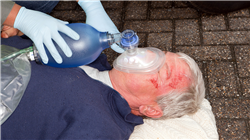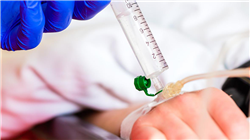University certificate
The world's largest faculty of nursing”
Introduction to the Program
Thanks to this 100% online Postgraduate diploma, you will provide excellent quality care to individuals who require immediate clinical care outside the hospital setting”

Outpatient emergencies are an ever-expanding field that requires comprehensive preparation of nurses. In this sense, professionals must respond effectively and promptly to different critical conditions ranging from Deep Venous Thrombosis or Hemoptysis to Central Nervous System Infections. In the face of this, experts need to update their clinical skills frequently to ensure an improvement in the condition of users and to reduce mortality in these severe scenarios. However, this updating can be challenging given their heavy workload.
For this reason, TECH has developed a revolutionary Postgraduate diploma in Nursing in Outpatient Emergencies. Designed by references in this field, the academic itinerary will delve into the most cutting-edge diagnostic techniques to stabilize patients (including drug administration, catheterization or management of Non-Invasive Mechanical Ventilation). In line with this, the syllabus will deal with the management of a wide range of pathologies, among which cardiovascular, neurological or digestive disorders stand out. In this way, graduates will obtain clinical skills to identify signs early and apply the most appropriate therapies in each case. In addition, the program will emphasize the multidisciplinary approach to Multiple-Victim Incidents, offering state-of-the-art triage techniques.
In terms of methodology, the program is taught completely online so that nurses can plan their own schedules. In addition, TECH uses its innovative learning system: Relearning. This allows professionals to consolidate the concepts of the syllabus in a progressive and natural way, without the need to resort to costly traditional techniques such as memorization. To access the Virtual Campus, all graduates will need is an electronic device with an Internet connection. In this way, experts will be able to enjoy the most pragmatic didactic materials on the academic scene.
With TECH you have the comfort in your hands by having the time flexibility to perform your sessions at any time of the day. What are you waiting for to enroll?"
This Postgraduate diploma in Nursing in Outpatient Emergencies contains the most complete and up-to-date scientific program on the market. The most important features include:
- The development of practical cases presented by experts in Emergencies and Medical Emergencies in the outpatient setting
- The graphic, schematic and eminently practical contents with which it is conceived gather scientific and practical information on those disciplines that are indispensable for professional practice
- Practical exercises where self-assessment can be used to improve learning
- Its special emphasis on innovative methodologies
- Theoretical lessons, questions to the expert, debate forums on controversial topics, and individual reflection assignments
- Content that is accessible from any fixed or portable device with an Internet connection
You will delve into the clinical care of terminally ill patients, which will allow you to develop mobilization strategies to prevent Pressure Ulcers”
The program’s teaching staff includes professionals from the sector who contribute their work experience to this specializing program, as well as renowned specialists from leading societies and prestigious universities.
The multimedia content, developed with the latest educational technology, will provide the professional with situated and contextual learning, i.e., a simulated environment that will provide immersive education programmed to learn in real situations.
This program is designed around Problem-Based Learning, whereby the professional must try to solve the different professional practice situations that arise during the course. For this purpose, students will be assisted by an innovative interactive video system created by renowned and experienced experts.
You will incorporate into your daily practice the most sophisticated triage techniques to efficiently manage Multiple Casualty Incidents"

The innovative Relearning methodology will allow you to assimilate the most complex concepts of the syllabus in a progressive and natural way"
Why study at TECH?
TECH is the world’s largest online university. With an impressive catalog of more than 14,000 university programs available in 11 languages, it is positioned as a leader in employability, with a 99% job placement rate. In addition, it relies on an enormous faculty of more than 6,000 professors of the highest international renown.

Study at the world's largest online university and guarantee your professional success. The future starts at TECH”
The world’s best online university according to FORBES
The prestigious Forbes magazine, specialized in business and finance, has highlighted TECH as “the world's best online university” This is what they have recently stated in an article in their digital edition in which they echo the success story of this institution, “thanks to the academic offer it provides, the selection of its teaching staff, and an innovative learning method aimed at educating the professionals of the future”
A revolutionary study method, a cutting-edge faculty and a practical focus: the key to TECH's success.
The most complete study plans on the university scene
TECH offers the most complete study plans on the university scene, with syllabuses that cover fundamental concepts and, at the same time, the main scientific advances in their specific scientific areas. In addition, these programs are continuously being updated to guarantee students the academic vanguard and the most in-demand professional skills. In this way, the university's qualifications provide its graduates with a significant advantage to propel their careers to success.
TECH offers the most comprehensive and intensive study plans on the current university scene.
A world-class teaching staff
TECH's teaching staff is made up of more than 6,000 professors with the highest international recognition. Professors, researchers and top executives of multinational companies, including Isaiah Covington, performance coach of the Boston Celtics; Magda Romanska, principal investigator at Harvard MetaLAB; Ignacio Wistumba, chairman of the department of translational molecular pathology at MD Anderson Cancer Center; and D.W. Pine, creative director of TIME magazine, among others.
Internationally renowned experts, specialized in different branches of Health, Technology, Communication and Business, form part of the TECH faculty.
A unique learning method
TECH is the first university to use Relearning in all its programs. It is the best online learning methodology, accredited with international teaching quality certifications, provided by prestigious educational agencies. In addition, this disruptive educational model is complemented with the “Case Method”, thereby setting up a unique online teaching strategy. Innovative teaching resources are also implemented, including detailed videos, infographics and interactive summaries.
TECH combines Relearning and the Case Method in all its university programs to guarantee excellent theoretical and practical learning, studying whenever and wherever you want.
The world's largest online university
TECH is the world’s largest online university. We are the largest educational institution, with the best and widest online educational catalog, one hundred percent online and covering the vast majority of areas of knowledge. We offer a large selection of our own degrees and accredited online undergraduate and postgraduate degrees. In total, more than 14,000 university degrees, in eleven different languages, make us the largest educational largest in the world.
TECH has the world's most extensive catalog of academic and official programs, available in more than 11 languages.
Google Premier Partner
The American technology giant has awarded TECH the Google Google Premier Partner badge. This award, which is only available to 3% of the world's companies, highlights the efficient, flexible and tailored experience that this university provides to students. The recognition as a Google Premier Partner not only accredits the maximum rigor, performance and investment in TECH's digital infrastructures, but also places this university as one of the world's leading technology companies.
Google has positioned TECH in the top 3% of the world's most important technology companies by awarding it its Google Premier Partner badge.
The official online university of the NBA
TECH is the official online university of the NBA. Thanks to our agreement with the biggest league in basketball, we offer our students exclusive university programs, as well as a wide variety of educational resources focused on the business of the league and other areas of the sports industry. Each program is made up of a uniquely designed syllabus and features exceptional guest hosts: professionals with a distinguished sports background who will offer their expertise on the most relevant topics.
TECH has been selected by the NBA, the world's top basketball league, as its official online university.
The top-rated university by its students
Students have positioned TECH as the world's top-rated university on the main review websites, with a highest rating of 4.9 out of 5, obtained from more than 1,000 reviews. These results consolidate TECH as the benchmark university institution at an international level, reflecting the excellence and positive impact of its educational model.” reflecting the excellence and positive impact of its educational model.”
TECH is the world’s top-rated university by its students.
Leaders in employability
TECH has managed to become the leading university in employability. 99% of its students obtain jobs in the academic field they have studied, within one year of completing any of the university's programs. A similar number achieve immediate career enhancement. All this thanks to a study methodology that bases its effectiveness on the acquisition of practical skills, which are absolutely necessary for professional development.
99% of TECH graduates find a job within a year of completing their studies.
Postgraduate Diploma in Nursing in Outpatient Emergencies
Nursing requires constant updating of knowledge and skills, since it is a requirement to remain at the forefront in different areas, including the provision of services in unforeseen situations that require immediate intervention. Because of this, at TECH we have developed a Postgraduate Diploma in Nursing in Outpatient Emergencies. A high-level academic program designed to correctly address the multiple emergencies that may arise. You will learn in depth topics such as the pathophysiology of medical transport, basic cardiopulmonary resuscitation with AED, pharmacology and general procedures for action in case of catastrophes. In this way, you will be able to coordinate emergency centers and perform nursing interventions with the highest quality and safety based on the latest scientific evidence. Take this online postgraduate diploma and add new skills to your career to achieve professional success.
Get certified at the largest nursing school in the world
At TECH we have the most innovative educational technology, we developed this Postgraduate Diploma in conjunction with the best specialists in the sector, which will allow you to strengthen all your knowledge to meet the challenges that this field requires. Throughout six months you will specialize in intervening, assisting and transporting patients with pathologies that require immediate attention. In addition, you will be specialized to be an expert in multiple emergencies, including cardiovascular, neurological, digestive, nephro-urological and traumatological emergencies, among others. You will also be able to provide pre-hospital care and other services such as cardiopulmonary resuscitation, life support and the management of emergency cases on the move that must be attended in a specialized care center.
Study a postgraduate course completely online
The program is designed with the highest academic quality, in order to promote the continuous development of our students, through the use of the latest tools in the sector. Those nurses who wish to update their intellect and strengthen their knowledge in this area will find in TECH Global University the most complete and updated scientific course. By taking this program they will be qualified to provide timely care to help reduce the sequelae and complications that a patient may present. Also, they will delve into topics such as the management of poisoning, pediatric, psychiatric and respiratory emergencies.







